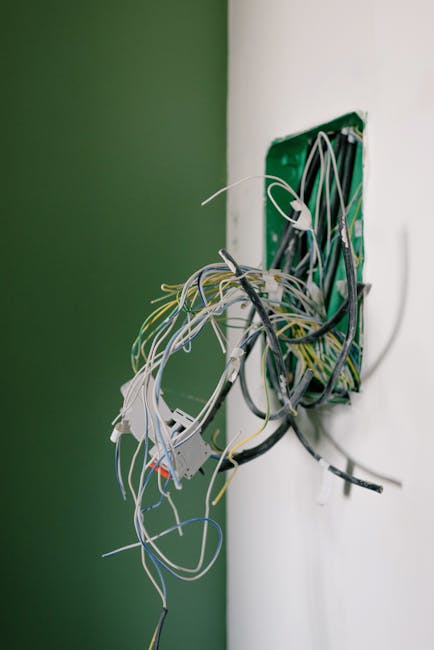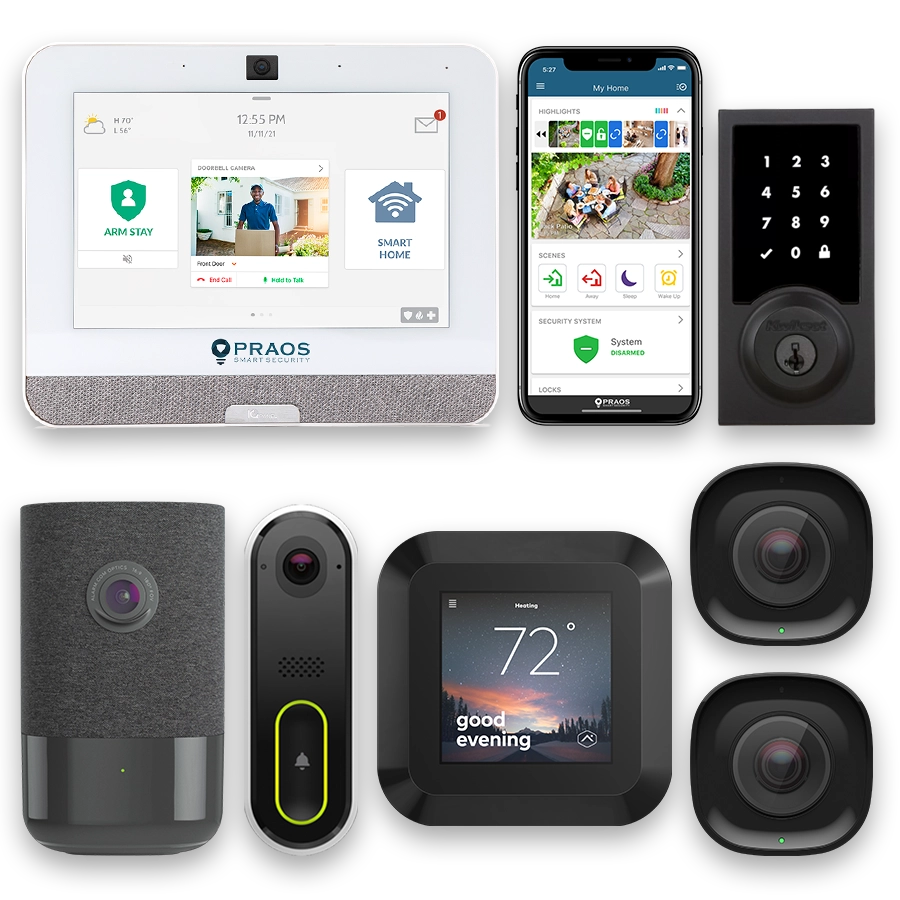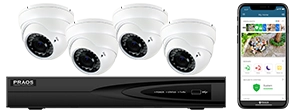Introduction to Home Security Systems
Home security systems have evolved significantly over the years, incorporating advanced technology to provide comprehensive protection against a range of potential threats. The primary purpose of a home security system is to safeguard your property and ensure the safety of its occupants. Historically, these systems were limited to basic burglar alarms, but modern security systems now include sensors, surveillance cameras, and smart home integration features.
There are various reasons why homeowners invest in security systems, including the desire to protect valuables, deter crime, and gain peace of mind. According to the Federal Bureau of Investigation (FBI), homes without security systems are approximately 300% more likely to be broken into. This statistic underscores the effectiveness of security systems in preventing crime.
The core functionality of a home security system hinges on its various components, all working together to detect, alert, and respond to potential threats. These components typically include:
- Control Panels
- Security Cameras
- Motion Sensors
- Door and Window Sensors
- Alarms and Sirens
Each of these components plays a vital role in monitoring and securing your home. For instance, security cameras allow for real-time visual surveillance, while motion sensors detect unapproved movements within the protected area. The effective integration of these components ensures that any unusual activities are promptly identified and addressed.
Furthermore, the advancement in technology has introduced smart home capabilities, whereby security systems can be controlled and monitored remotely via smartphones or other devices. This added layer of control enhances the convenience and functionality of modern security systems.
The effectiveness of any home security system depends not only on its installation but also on regular maintenance. Without proper upkeep, the likelihood of system malfunctions or component failures increases, which can compromise the overall security of your home. For example:
| Component | Possible Issues Due to Lack of Maintenance |
|---|---|
| Control Panels | Software glitches, unresponsive interfaces |
| Security Cameras | Blurry footage, connectivity issues |
| Motion Sensors | False alarms, failure to detect movement |
| Door and Window Sensors | Battery depletion, failing to trigger alarm |
| Alarms and Sirens | Weak sound output, delayed activation |
Regular maintenance is therefore crucial to ensure that all components are functioning optimally. Neglecting this aspect can not only diminish the effectiveness of the system but also create a false sense of security. By adhering to a regular maintenance schedule, homeowners can ensure the longevity and reliability of their security systems. This practice includes routine checks, timely replacements of batteries, and software updates to address any potential vulnerabilities.
In summary, investing in a home security system is a prudent measure to protect your property and loved ones. However, ongoing maintenance is essential to preserve the system’s reliability and effectiveness. By understanding the importance of regular maintenance, homeowners can maximize the benefits of their security systems and maintain a secure living environment.
Understanding the Components of Home Security Systems
A home security system consists of various interconnected components, each playing a crucial role in ensuring the safety and security of the household. Understanding these components is fundamental for recognizing the importance of regular maintenance.
1. Control Panel: The control panel is the central hub that monitors and communicates with all other components of the security system. It processes signals from sensors and initiates alerts and notifications.
2. Sensors: Different types of sensors detect unauthorized entry or unusual activity. Common sensors include:
- Door/Window Sensors: These detect when doors or windows are opened.
- Motion Detectors: These sense movement within a specific range.
- Glass Break Sensors: These recognize the sound of breaking glass.
3. Surveillance Cameras: Cameras provide video surveillance, allowing real-time monitoring and recording. They come in various types, including indoor, outdoor, wired, and wireless.
4. Alarms and Sirens: Audible alarms and sirens are triggered by the control panel in response to potential security breaches. They serve to immediately alert occupants and deter intruders.
5. Keypads and Entry Descriptions: Keypads allow users to activate or deactivate the system using a code. Biometric or card-based entry systems provide additional layers of security.
6. Communication Modules: These modules enable the system to communicate with external monitoring services or the homeowner’s mobile device. They can use landline, cellular, or internet connections.
7. Power Supplies and Backup Batteries: Reliable power is crucial for the continuous operation of the security system. Backup batteries ensure functionality during power outages.
| Component | Function |
|---|---|
| Control Panel | Main hub that monitors and controls other components. |
| Sensors | Detect unauthorized entry or unusual activity. |
| Surveillance Cameras | Provide real-time monitoring and recording. |
| Alarms and Sirens | Alert occupants and deter intruders. |
| Keypads and Entry Devices | Allow system activation/deactivation. |
| Communication Modules | Enable external communication. |
| Power Supplies | Ensure continuous power and include backup options. |
Understanding these components highlights the need for regular maintenance to ensure each part functions optimally. Regular checks and updates can prevent malfunctions and ensure the system remains effective in providing security.
Common Issues and Failures in Home Security Systems
Regular maintenance of home security systems is essential to prevent common issues and failures that could compromise your safety. Understanding these issues can help in recognizing the importance of consistent upkeep.
One of the most prevalent issues is battery failure. Many components of home security systems, such as sensors and cameras, rely on batteries. Over time, these batteries can deplete, leading to non-functional equipment. A 2019 study by Consumer Reports highlighted that nearly 20% of surveyed users experienced system failures due to dead batteries.
Another common problem is outdated software. Security systems, like any digital device, depend on software to function correctly. Manufacturers frequently release updates to address vulnerabilities and enhance functionality. Not updating the system’s software can leave it exposed to hacking. According to data published by the Cybersecurity and Infrastructure Security Agency (CISA), over 30% of security breaches in 2020 were attributed to unpatched systems.
Sensor malfunctions are also a significant concern. These sensors can become misaligned or dirty, resulting in false alarms or failure to detect intrusions. Regular cleaning and recalibration are necessary to ensure they operate correctly. A 2018 report by the National Institute of Standards and Technology (NIST) found that 25% of false alarms were due to sensor issues.
Communications failures are another critical issue. Many systems rely on internet or phone connections to send alerts to homeowners or monitoring centers. Any interruption in these services can result in failures to alert authorities during an emergency. The Federal Communications Commission (FCC) documented that 40% of alarm failures reported in 2017 were due to communication disruptions.
Alarm wear and tear is inevitable over time. Physical components such as control panels, keypads, and cameras are subject to wear, which can impair their functionality. The Security Industry Association (SIA) notes that components typically need to be checked and possibly replaced every 5 to 7 years to maintain optimal performance.
Environmental factors can also impact system performance. Extreme weather conditions, such as heavy rain, snow, or high heat, can damage outdoor cameras and sensors. Ensuring that these components are weatherproof and routinely checked can mitigate such risks. Data compiled by the Insurance Institute for Business & Home Safety (IBHS) indicates that 15% of system failures were attributed to environmental causes.
Recognizing these common issues highlights the necessity for regular maintenance. By addressing battery failures, software updates, sensor malfunctions, communication disruptions, physical wear and tear, and environmental factors, homeowners can significantly reduce the risk of their security systems failing when they are needed most.
Benefits of Regular Maintenance on Home Security Systems
Regular maintenance of home security systems is not just about ensuring the longevity of the devices but also about maintaining the integrity and functionality of the entire system. There are several significant benefits that homeowners can reap by committing to routine maintenance checks and updates.
Enhanced Reliability
One of the primary benefits of regular maintenance is enhanced reliability. Addressing potential issues before they escalate ensures that your security system is always ready to protect your property. Regularly maintained systems are less likely to experience unexpected failures, which could compromise home security.
Extended Lifespan
Like any other technology, security systems benefit from regular upkeep. Components such as cameras, sensors, and control panels can have an extended lifespan when they are regularly cleaned, updated, and inspected for wear and tear. This can reduce the need for frequent replacements, ultimately saving costs.
Improved Performance
Systems that are regularly maintained tend to perform at their optimal level. Updating software, recalibrating sensors, and ensuring all components are in good working order can significantly enhance the performance of the entire security system.
Cost Efficiency
Regular maintenance can be more cost-effective in the long run. By preventing major breakdowns and extending the lifespan of your equipment, you can avoid hefty repair or replacement costs. Moreover, efficient systems often attract discounts on insurance premiums.
Ensuring Compliance
For those who live in areas where security systems must meet certain standards or regulations, regular maintenance can ensure compliance. Regular checks can affirm that your system meets all local safety and security requirements, avoiding potential legal issues.
Up-to-Date Technology
Routine maintenance often includes software updates that can improve functionality and security features. Staying updated with the latest technology ensures that your security system is equipped to handle new threats and vulnerabilities.
| Benefit | Description |
|---|---|
| Enhanced Reliability | Prevents unexpected failures, ensuring continuous protection. |
| Extended Lifespan | Prolongs the life of components, reducing the need for replacements. |
| Improved Performance | Maintains optimal functionality of the system. |
| Cost Efficiency | Avoids major repairs, with potential insurance discounts. |
| Ensuring Compliance | Keeps the system in line with local regulations. |
| Up-to-Date Technology | Includes the latest software updates for enhanced security. |
In conclusion, the benefits of regular maintenance on home security systems are manifold, ranging from reliability and cost efficiency to ensuring compliance with legal standards. By maintaining your security system regularly, you provide a safer and more secure environment for your home and loved ones.
Guidelines for Effective Maintenance Practices
Proper maintenance of your home security system is crucial to ensure its optimal performance. This chapter provides practical guidelines for effective maintenance practices.
1. Regular Testing
It is essential to regularly test your home security system to confirm that all components are functioning correctly. Systems should be tested at least once a month, following the manufacturer’s instructions.
2. Inspecting Physical Components
Regularly inspect all physical components of the security system, including cameras, sensors, and control panels, for any signs of wear and tear. Replace any faulty or damaged parts immediately to maintain system integrity.
- Check camera lens for dirt or obstructions
- Ensure sensors are securely mounted
- Examine cables for any physical damage
3. Battery Checks
Batteries power critical components of your home security system. Ensure to check and replace the batteries periodically to avoid system failures. It is recommended to change the batteries every six months or as advised by the manufacturer.
4. Software Updates
Like any modern technology, home security systems often require software updates to fix bugs, enhance features, or improve security measures. Always install the latest software updates as soon as they are available.
5. Professional Inspections
While regular DIY maintenance is key, professional inspections can offer thorough system checks that might not be possible otherwise. Schedule an annual inspection with your security provider.
| Task | Recommended Frequency |
|---|---|
| System Testing | Monthly |
| Battery Check | Every Six Months |
| Software Update | As Available |
| Professional Inspection | Annually |
6. Cleaning
Regular cleaning of your security components ensures that they are free from dust and debris, which can affect functionality. Use a soft cloth to gently clean the lenses and surface areas.
7. Testing Backup Power
If your system includes a backup power source, ensure it is functional by testing it periodically. Backup power is crucial in times of power outages to maintain security.
By following these guidelines, you can help ensure your home security system remains reliable and effective in safeguarding your property.
Conclusion: Ensuring Long-Term Security
In conclusion, ensuring the long-term security of your home through regular maintenance of your security system is indispensable. Unlike many other home appliances, security systems are your first line of defense against potential threats, and their optimal functioning cannot be underestimated.
Neglecting maintenance can lead to overlooked vulnerabilities that may compromise your safety. According to data from the Bureau of Justice Statistics, homes without working security systems are more likely to be targeted by intruders. By adhering to regular maintenance schedules, you can proactively address minor issues before they escalate into major failures, ensuring your system operates effectively at all times.
It is essential to follow manufacturer guidelines and employ professional services for thorough inspections and updates. Regular maintenance not only enhances the performance of your security system but also extends its lifespan, providing a reliable safeguard for your home over the years.
Commit to regular maintenance practices, and prioritize your home’s security. In doing so, you can enjoy peace of mind knowing that your home is well-protected against both everyday and extraordinary risks.





